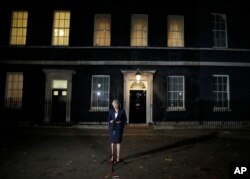The chances of Britain crashing out of the European Union by default with no deal in place are growing, as lawmakers appear unlikely to support the deal Prime Minister Theresa May struck with the bloc. A parliamentary vote on the agreement is scheduled next week.
Britain's European Union exit on March 29 is written into British law, and new legislation would be required to cancel it. Delaying Britain's departure would also require unanimous agreement from the 27 other EU member states under the Article 50 process, which is seen unlikely unless Britain planned to hold another referendum.
Governments and businesses in Europe are trying to prepare for the chaos that would follow a "no-deal" Brexit, with supply chains, energy networks and basic cross-border services like banking and insurance facing prolonged uncertainty.
'Too little, too late'
Nearly 100 trucks took part in a drill to test Britain's contingency plans Monday. From a disused airfield commandeered as a truck park, the convoy snaked through 30 kilometers of rush-hour traffic to the port of Dover.
About 10,000 trucks pass through Dover every day, bringing vital supplies from the continent and sending Britain's exports to the European Union and beyond. Planners warn any customs or security delays could cause traffic lines of 50 kilometers. Dover's Conservative MP Charlie Elphicke said the drill was too little, too late, "I welcome the Department for Transport ramping up Brexit preparations, but this trial is on far too small a scale."
British economy suffering
May's hopes of passing her Brexit deal in parliament, designed to ensure a smooth exit, appear slim. She said Monday the vote will go ahead despite widespread cross-party opposition.
"We are continuing to work on further assurances and further undertakings from the European Union," May said in a speech.
Meanwhile Britain's economy is stuck in the slow lane, with 0.1 percent growth in the last quarter.
Brexit, alongside global trade tensions, are also weighing on Eurozone economies. In France, analysts say the "yellow vest" anti-government protests have dented growth.
That movement has now spread to Britain. In recent days Brexit supporters wearing yellow high-visibility vests have picketed parliament and tried to block roads, demanding the referendum result is fulfilled.
"We want Brexit and we want it delivered now. We didn't vote for any half measures. We voted out and we should be out," pro-Brexit protester Jackie Harkins told VOA.
Poll shows shift to staying in EU
But the biggest poll since the referendum shows a shift in favor of remaining in the European Union, by 54 percent to 46 percent. So could Britain hold another vote? Many fear the wider consequences, says Alan Wager of the U.K. in a Changing Europe program at Kings College London.
"If there was another referendum, how divisive would it be? Would it be even worse than the last one?"
Theresa May is hoping last-minute EU concessions will rescue her deal, but Brussels says negotiations are finished.
So businesses are triggering contingency plans. Medicines are being stockpiled. The public is being warned of potential food shortages. A no-deal Brexit is edging closer while Britain's politicians remain gridlocked.






